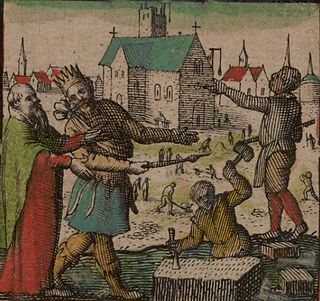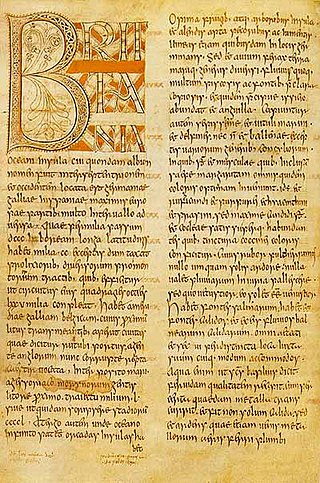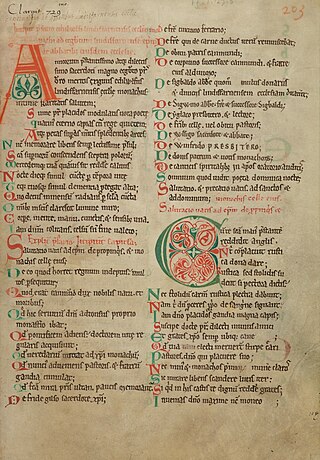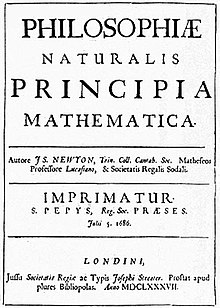
Bede, also known as Saint Bede, the Venerable Bede, and Bede the Venerable, was an English monk, author and scholar. He was one of the greatest teachers and writers during the Early Middle Ages, and his most famous work, Ecclesiastical History of the English People, gained him the title "The Father of English History". He served at the monastery of St Peter and its companion monastery of St Paul in the Kingdom of Northumbria of the Angles.

Bretwalda is an Old English word. The first record comes from the late 9th-century Anglo-Saxon Chronicle. It is given to some of the rulers of Anglo-Saxon kingdoms from the 5th century onwards who had achieved overlordship of some or all of the other Anglo-Saxon kingdoms. It is unclear whether the word dates back to the 5th century and was used by the kings themselves or whether it is a later, 9th-century, invention. The term bretwalda also appears in a 10th-century charter of Æthelstan. The literal meaning of the word is disputed and may translate to either 'wide-ruler' or 'Britain-ruler'.

Cædmon is the earliest English poet whose name is known. A Northumbrian cowherd who cared for the animals at the double monastery of Streonæshalch during the abbacy of St. Hilda, he was originally ignorant of "the art of song" but learned to compose one night in the course of a dream, according to the 8th-century historian Bede. He later became a zealous monk and an accomplished and inspirational Christian poet.

Medieval literature is a broad subject, encompassing essentially all written works available in Europe and beyond during the Middle Ages. The literature of this time was composed of religious writings as well as secular works. Just as in modern literature, it is a complex and rich field of study, from the utterly sacred to the exuberantly profane, touching all points in-between. Works of literature are often grouped by place of origin, language, and genre.

Sæberht, Saberht or Sæbert was an Anglo-Saxon King of Essex, in succession of his father King Sledd. He is known as the first East Saxon king to have been converted to Christianity.

The Ecclesiastical History of the English People, written by Bede in about AD 731, is a history of the Christian Churches in England, and of England generally; its main focus is on the conflict between the pre-Schism Roman Rite and Celtic Christianity. It was composed in Latin, and is believed to have been completed in 731 when Bede was approximately 59 years old. It is considered one of the most important original references on Anglo-Saxon history, and has played a key role in the development of an English national identity.
Ecgberht was an Anglo-Saxon monk of Northumbria. After studying at Lindisfarne and Rath Melsigi, he spent his life travelling among monasteries in northern Britain and around the Irish Sea. He was instrumental in the establishment of Wihtberht's mission to Frisia.
Historians in England during the Middle Ages helped to lay the groundwork for modern historical historiography, providing vital accounts of the early history of England, Wales and Normandy, its cultures, and revelations about the historians themselves.

The Saint Petersburg Bede, formerly known as the Leningrad Bede, is an Anglo-Saxon illuminated manuscript, a near-contemporary version of Bede's 8th century history, the Historia ecclesiastica gentis Anglorum. Although not heavily illuminated, it is famous for containing the earliest historiated initial in European illumination. It is so named because it was taken to the Russian National Library of Saint Petersburg in Russia at the time of the French Revolution, by Peter P. Dubrovsky.

British Library, MS Cotton Tiberius C. II, or the Tiberius Bede, is an 8th-century illuminated manuscript of Bede's Historia ecclesiastica gentis Anglorum. It is one of only four surviving 8th-century manuscripts of Bede, another of which happens to be MS Cotton Tiberius A. XIV, produced at Monkwearmouth–Jarrow Abbey. As such it is one of the closest texts to Bede's autograph. The manuscript has 155 vellum folios. This manuscript may have been the Latin text on which the Alfredian Old English translation of Bede's Ecclesiastical History was based. The manuscript is decorated with zoomorphic initials in a partly Insular and partly Continental style.
The Moore Bede is an early manuscript of Bede's 8th-century Historia ecclesiastica gentis Anglorum. It was formerly owned by Bishop John Moore (1646–1714), whose collection of books and manuscripts was purchased by George I and donated to Cambridge University.
Anglo-Latin literature is literature from originally written in Latin and produced in England or other English-speaking parts of Britain and Ireland. It was written in Medieval Latin, which differs from the earlier Classical Latin and Late Latin.
Abraham Wheelock was an English linguist. He was the first Cambridge professor of Arabic.

De abbatibus is a Latin poem in eight hundred and nineteen hexameters by the ninth-century Anglo-Saxon monk Æthelwulf (Ædiluulf), a name meaning "noble wolf", which the author sometimes Latinises as Lupus Clarus. It recounts the history of his monastery from its foundation through its six first abbots and ending with Æthelwulf's two visions. It is addressed to the Bishop of Lindisfarne, Ecgberht, and dates to between 803 and 821.
The Chanson de Guillaume, also called Chançun de Willame, is a chanson de geste from the first half of the twelfth-century. The work is generally considered to have two distinct halves: the first tells of Guillaume of Orange, his nephew Vivien and the latter's young brother Gui and their various battles with Saracens at L'Archamp; in the second half of the poem, Guillaume is aided by Rainouard, a giant.

Peter Petrovich Dubrovsky Russian: Пётр Петрович Дубровский, was a Russian bibliophile, diplomat, paleographer, secretary of the Russian Embassy in France, collector of manuscripts and books. Throughout his life he collected about 2000 manuscripts. Between 1805 and 1812 he worked at the Imperial Public Library.

Cædmon's Hymn is a short Old English poem attributed to Cædmon, a supposedly illiterate and unmusical cow-herder who was, according to the Northumbrian monk Bede, miraculously empowered to sing in honour of God the Creator. The poem is Cædmon's only known composition.
The Gesta Pontificum Anglorum, originally known as De Gestis Pontificum Anglorum and sometimes anglicized as The History or The Chronicle of the English Bishops, is an ecclesiastical history of England written by William of Malmesbury in the early 12th century. It covers the period from the arrival of St Augustine in AD 597 until the time it was written. Work on it was begun before Matilda's death in 1118 and the first version of the work was completed in about 1125. William drew upon extensive research, first-hand experience and a number of sources to produce the work. It is unusual for a medieval work of history, even compared to William's other works, in that its contents are so logically structured. The History of the English Bishops is one of the most important sources regarding the ecclesiastical history of England for the period after the death of Bede.
Michael Lapidge, FBA is a scholar in the field of Medieval Latin literature, particularly that composed in Anglo-Saxon England during the period 600–1100 AD; he is an emeritus Fellow of Clare College, Cambridge, a Fellow of the British Academy, and winner of the 2009 Sir Israel Gollancz Prize.










